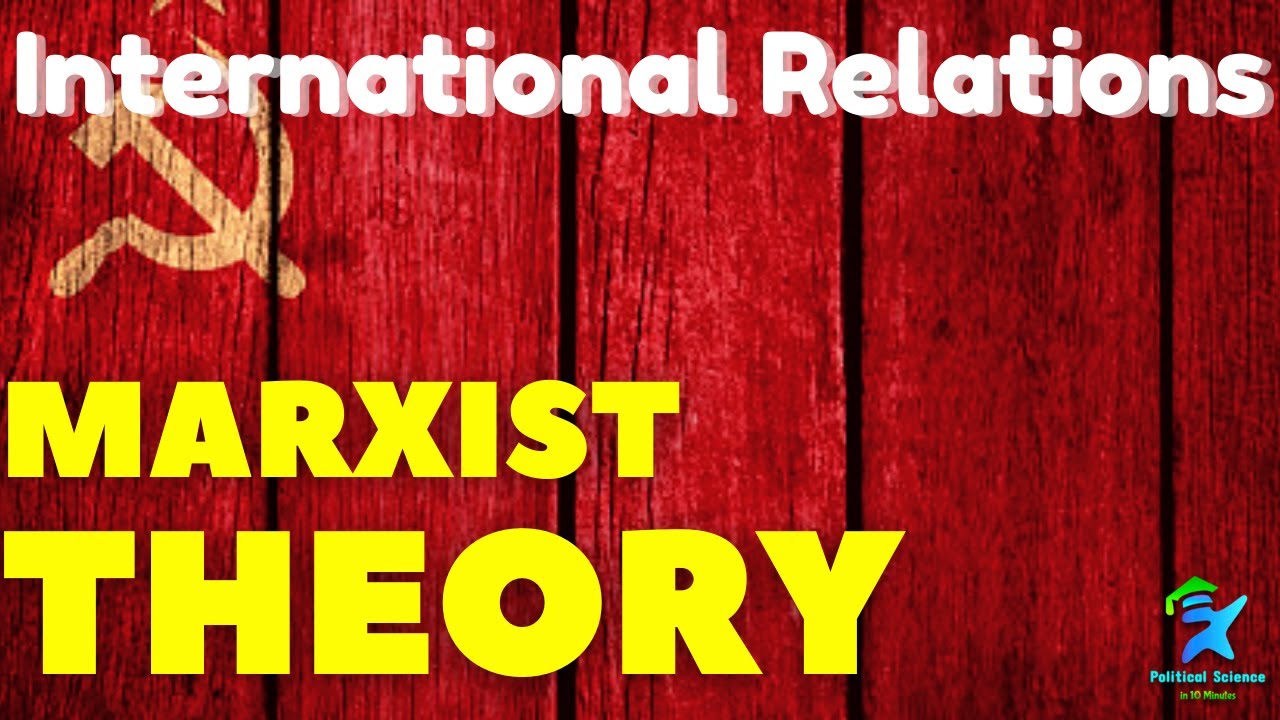What is Marxism? Marxism in International Relations Explained Shortly!
Summary
TLDRIn this video, the channel dives into Marxist theory in International Relations (IR). Marxism critiques capitalism, viewing it as a system that perpetuates class struggle, with the bourgeoisie owning the means of production and the proletariat providing labor. The video explains that capitalism leads to imperialism, colonialism, and war due to the system's need for expansion and new resources. It also discusses how the state serves the interests of the capitalist class and argues that a classless society would eventually eliminate the need for the state. The video concludes by inviting viewers to stay tuned for future content on Marxist theorists.
Takeaways
- 😀 Marxism in IR is primarily a critique of capitalism, which is seen as an economic system that creates class-based societies.
- 😀 Capitalism supports a free market economy, private property, and social relations based on these properties, leading to commodification of human labor.
- 😀 Marxism argues that capitalism divides society into two main classes: the bourgeoisie (owners of capital) and the proletariat (workers).
- 😀 The bourgeoisie accumulates wealth while the proletariat remains stagnant, with no opportunity to transition into the bourgeoisie class.
- 😀 Class struggle, driven by capitalism, imperialism, and colonialism, is the root cause of global conflicts and wars according to Marxism.
- 😀 The relationship between agency (workers and worker groups) and structure (the capitalist state) is essential to understanding the Marxist perspective in IR.
- 😀 Marxism posits that human nature is shaped by material conditions, not natural instincts, and can change if capitalism is abolished.
- 😀 Capitalism's expansionist nature seeks to maximize wealth by exploiting new markets and natural resources, often leading to imperialism and colonialism.
- 😀 The state is seen as an instrument of the bourgeoisie, serving the interests of the capitalist class due to its reliance on private investment.
- 😀 Marxism argues that the modern state and capitalist systems are intertwined, with the state representing the interests of the bourgeoisie.
- 😀 In a revolution, the state would be overthrown by workers and ultimately destroyed, as a classless society would no longer need a state to exist.
Q & A
What is the most basic definition of Marxism in international relations (IR)?
-Marxism in international relations is primarily defined as the critique of capitalism, which is seen as an economic system that supports a free market economy, private property, and social relations based on these properties. It argues that capitalism leads to a class-based society.
How does Marxism define capitalism?
-Marxism defines capitalism as an economic system that promotes free market economy, private property, and social relations based on these properties. It also focuses on the commodification of human labor, where labor is bought and sold on the market.
What are the two main social classes in a capitalist society, according to Marxism?
-According to Marxism, society is divided into two main classes: the bourgeoisie, who own the means of production (capital), and the proletariat, who are the working class that sells their labor.
Why is it impossible for the proletariat to become bourgeoisie?
-Marxism argues that it is impossible for the proletariat to become bourgeoisie because the proletariat can never own the means of production (capital), which is a key component in maintaining the capitalist system.
What are the three main causes of war according to Marxism?
-Marxism identifies three main causes of war: capitalism, imperialist rivalry, and the race for colonization. These factors contribute to ongoing class struggles and global conflict.
What does the Marxist theory say about the relationship between agency and structure?
-In Marxism, the agency represents the workers and worker groups, while the structure represents the state as a part of the capitalist system. The theory examines how the class struggle unfolds between the agency (workers) and the structure (state).
How does Marxism view human nature?
-Marxism argues that human nature is a historical product shaped by material conditions, not natural ones. If humans are greedy and self-interested, it is because of the material conditions under which they live, not an inherent trait. Abolishing capitalism could lead to a different human nature and an alternative international system.
What is the expansionist nature of capitalism as seen by Marxism?
-Marxism argues that capitalism has an expansionist nature, where it constantly seeks new markets and resources beyond national borders to maximize wealth. This need for resources leads to imperialism and colonialism, where more powerful states exploit weaker ones.
How does Marxism perceive the state in relation to capitalism?
-Marxism sees the state as an autonomous actor that serves the interests of the bourgeoisie. The state and the capitalist system are considered two sides of the same coin, with the state supporting the capitalist class due to its reliance on private investment.
What happens to the state in the case of a revolution, according to Marxist theory?
-In the case of a revolution, Marxism argues that the state will eventually fall into the hands of the workers and will be destroyed altogether. This is because, in a classless society, the state is no longer necessary.
Outlines

This section is available to paid users only. Please upgrade to access this part.
Upgrade NowMindmap

This section is available to paid users only. Please upgrade to access this part.
Upgrade NowKeywords

This section is available to paid users only. Please upgrade to access this part.
Upgrade NowHighlights

This section is available to paid users only. Please upgrade to access this part.
Upgrade NowTranscripts

This section is available to paid users only. Please upgrade to access this part.
Upgrade NowBrowse More Related Video

Marxist Theory of International Relations | Marxist Approach | International Relations Theory

Critical Theory - Marxism

What is English School? Theory of English School in International Relations Explained Shortly!

Is Studying International Relations Worth It?

Marxismo: Ideologia e Alienação - Brasil Escola

Constructivism International Relations: Ideas (Not Tanks) Change Global Politics!
5.0 / 5 (0 votes)